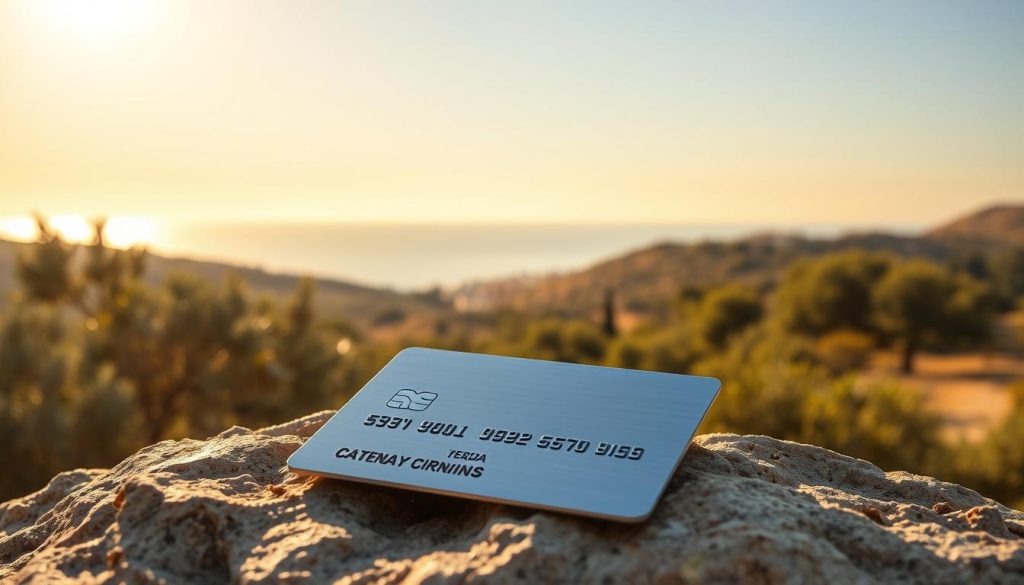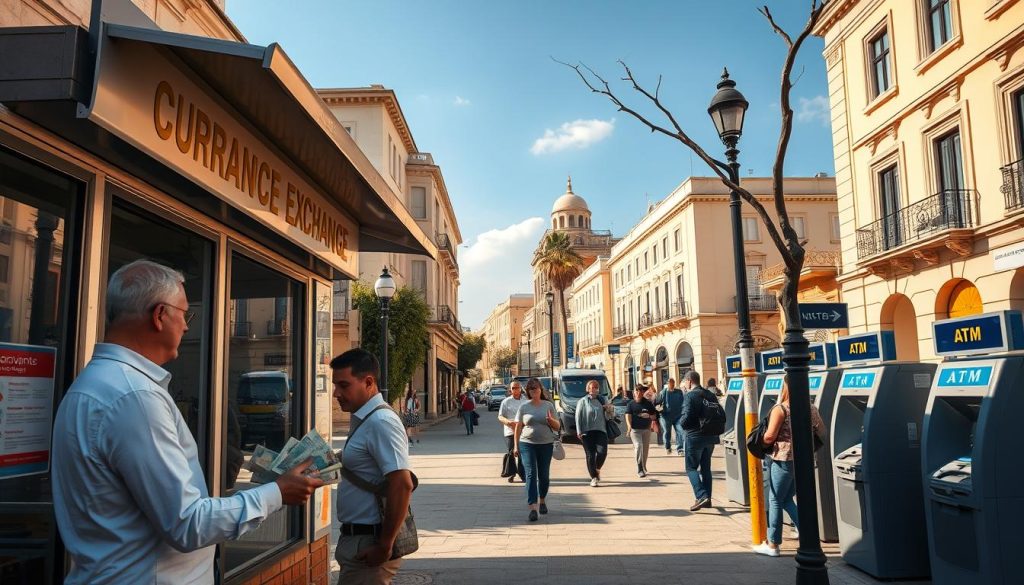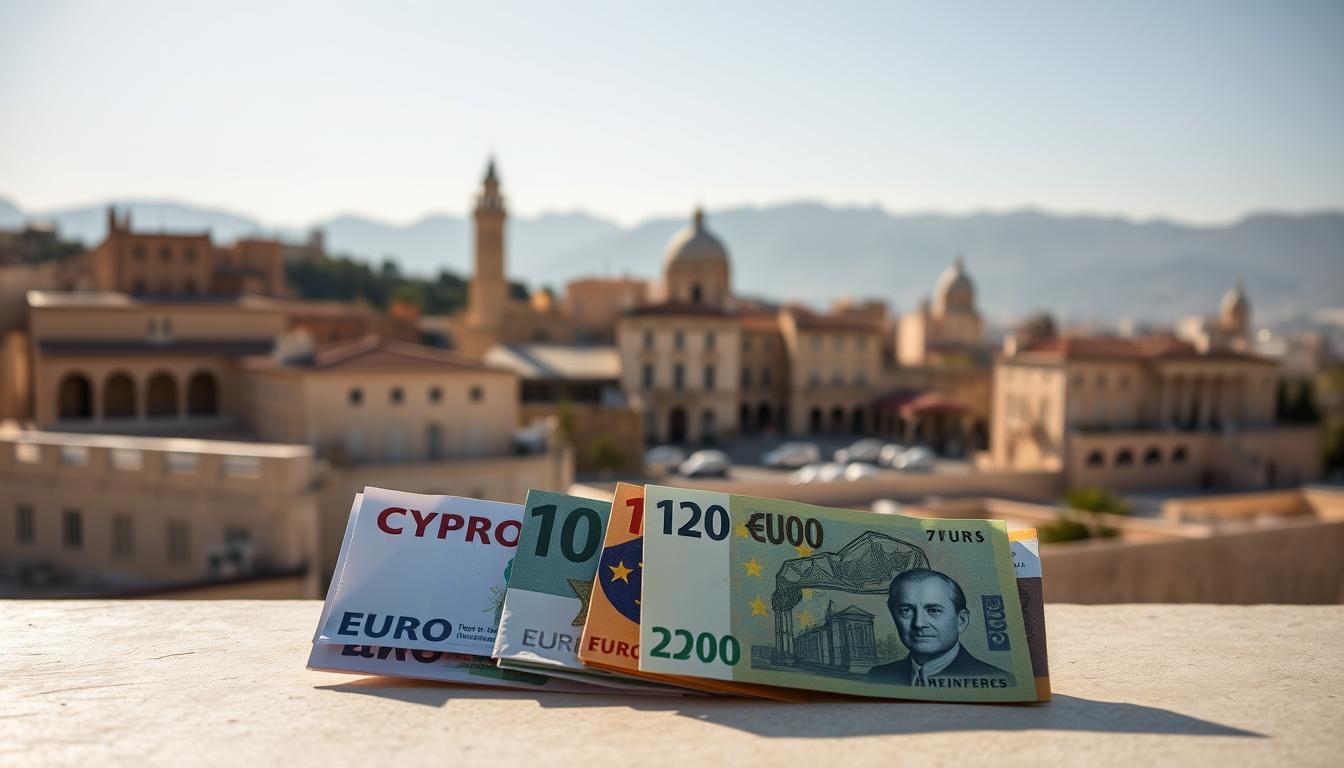Did you know that over 80% of tourists in this Mediterranean destination use the euro as their primary currency? This small yet fascinating country offers a unique blend of ancient history and modern financial systems, making it a must-visit spot for travelers.
As you plan your trip, understanding the local currency is key to managing your money wisely. The euro is the official currency here, but there’s a twist: Northern Cyprus uses the Turkish lira. This dual-currency system adds an interesting layer to your travel experience.
Whether you’re exploring stunning coastlines or diving into ancient ruins, knowing how to handle your money will save you time and avoid unnecessary fees. This guide will help you navigate exchange rates, plan your budget, and make informed decisions for a seamless journey.
Understanding Currency in Cyprus
The island’s dual-currency system adds a unique twist to your financial planning. In the southern part, the euro is the official currency, adopted in 2008. This move replaced the Cypriot pound, aligning the country with the eurozone.
The euro is divided into 100 cents, making it easy to handle smaller transactions. You’ll find seven banknote denominations: 5€, 10€, 20€, 50€, 100€, 200€, and 500€. Each features distinct designs and security features like holographic images and watermarks.
Coins come in eight values, ranging from 1 cent to 2 euros. Cypriot coins showcase unique designs, such as the ancient cruciform idol and a trading vessel. These details add a touch of local culture to your everyday transactions.
Official Currency Overview: The Euro and Its Denominations
When using the euro, it’s essential to check your banknotes for authenticity. Look for watermarks, holograms, and raised print to ensure they’re genuine. This simple step can save you from counterfeit issues.
Coins are equally important for smaller purchases. The 1 and 2 euro coins are ideal for public transport or tipping. Keep a mix of coins and banknotes handy for convenience.
Currency in Northern Cyprus: Navigating the Turkish Lira
In Northern Cyprus, the Turkish lira (₺) is the primary currency. Its code is TRY, and it’s also divided into 100 cents. While the euro is widely accepted in tourist areas, having some lira is useful for local markets and smaller vendors.
When exchanging money, compare rates to get the best deal. Avoid exchanging at airports or hotels, as they often charge higher fees. Understanding these distinctions ensures you manage your currency confidently during your travels.
Using Cards and Digital Payments in Cyprus
Modern payment methods have transformed how we handle transactions abroad. Whether you’re dining at a restaurant or shopping at a local market, using a card or digital wallet can make your experience seamless. Most hotels, restaurants, and tourist spots accept major debit and credit cards, but it’s wise to be mindful of potential foreign transaction fees.

Using a debit card is particularly convenient for everyday expenses. However, some smaller vendors or rural areas may prefer cash, so it’s a good idea to carry both. When choosing a card for travel, consider options like the Wise Multi-Currency Card or Revolut, which offer competitive exchange rates and low fees.
Debit and Credit Card Acceptance
Visa and Mastercard are widely accepted in tourist areas, making them reliable choices for travelers. However, always check with your bank about foreign transaction fees, as these can add up quickly. Some cards, like the Chase Sapphire Preferred, offer rewards on travel and dining, making them ideal for frequent travelers.
For added security, notify your bank of your travel plans to avoid unexpected card declines. Keep a mix of cards and cash to ensure you’re prepared for any situation.
Mobile Wallets and Contactless Payments
Digital wallets like Apple Pay, Google Pay, and PayPal are gaining popularity due to their convenience and security. Contactless payments are especially useful for quick transactions, such as public transport or small purchases. Many businesses now accept these methods, making them a great alternative to carrying physical cards.
When using mobile wallets, ensure your device is secure with a strong password or biometric lock. This adds an extra layer of protection for your financial information.
“Balancing card and cash payments ensures you’re prepared for any situation during your travels.”
By understanding the local payment landscape, you can enjoy a hassle-free experience while exploring this beautiful destination. Whether you prefer the convenience of a card or the simplicity of cash, planning ahead will save you time and money.
Currency Exchange and ATM Tips
Smart currency exchange and ATM use can save you time and money. Whether you’re planning your trip or already on the ground, understanding the best practices ensures you avoid unnecessary fees and get the most out of your budget.

How to Exchange Currency Efficiently
Exchanging money doesn’t have to be complicated. Start by comparing rates online before your trip. Local banks often offer better rates than airport kiosks, which tend to charge higher fees. For example, the Bank of Cyprus provides competitive rates and reliable service.
If you’re already abroad, avoid exchanging large amounts at once. Instead, convert smaller sums as needed to minimize risks. Always check for hidden fees and ask about the total cost before finalizing any transaction.
Finding ATMs and Avoiding Hidden Fees
ATMs are widely available, even in smaller towns. When withdrawing cash, always choose the local currency option to avoid dynamic currency conversion fees. This small step can save you up to 4% on each transaction.
Look for ATMs affiliated with major banks, as they often have lower fees. Notify your bank about your travel plans to prevent unexpected card declines. Carrying a mix of cash and cards ensures you’re prepared for any situation.
Managing Overseas Transaction Costs
Overseas transactions can add up quickly if you’re not careful. Use a travel-friendly card like Wise or Revolut to avoid foreign transaction fees. These cards offer competitive exchange rates and low withdrawal limits.
Keep an eye on exchange rates and plan your withdrawals accordingly. If you’re offered a choice between your home currency and the local one, always opt for the latter to avoid additional charges.
“Planning ahead and understanding your options can make all the difference in managing your money abroad.”
By following these tips, you’ll navigate currency exchange and ATM use with confidence, ensuring a hassle-free experience wherever your travels take you.
Business Insights and Local Financial Infrastructure
Cyprus’s financial infrastructure plays a pivotal role in its appeal to international businesses. The island has long been recognized as a hub for Forex trading, attracting companies from around the globe. Its strategic location, combined with favorable financial regulations, makes it an ideal destination for businesses looking to expand their operations.

Cyprus as a Hub for Forex and International Business
Cyprus is a key player in the global Forex market. Its financial regulations are designed to attract international businesses, offering a stable and secure environment for trading. Many companies choose Cyprus for its competitive tax rates and access to the European market.
Forex trading in Cyprus is supported by advanced technology and a skilled workforce. This combination ensures efficient transactions and minimizes risks for merchants and investors alike. If you’re considering entering the Forex market, Cyprus offers a reliable platform to get started.
Local Payment Methods for Businesses
Local businesses in Cyprus have embraced modern payment solutions. Card payments, digital wallets, and online banking are widely used, making transactions seamless for both companies and customers. The Bank of Cyprus, a leading financial institution, provides robust services to support these payment methods.
For international businesses, multicurrency accounts are a game-changer. They allow you to hold and transact in multiple currencies, reducing the need for constant conversions. This flexibility is particularly useful for companies operating in diverse markets.
The Role of SEPA and Bank Transfers
The Single Euro Payments Area (SEPA) has revolutionized bank transfers within the EU. In Cyprus, SEPA enables fast and cost-effective Euro-denominated transactions. This system is especially beneficial for businesses that rely on cross-border payments.
Major banks like the Bank of Cyprus are fully integrated into the SEPA network. This ensures that your transfers are processed quickly and securely. Whether you’re paying suppliers or receiving payments, SEPA simplifies the process and reduces costs.
“Understanding Cyprus’s financial infrastructure can give your business a competitive edge in the global market.”
By leveraging the island’s advanced financial systems, you can streamline your operations and focus on growth. Whether you’re trading Forex or managing international payments, Cyprus offers the tools and support you need to succeed.
Cyprus: Ultimate Travelers Guide to Currencies & Payments
Managing your finances while traveling doesn’t have to be stressful with the right strategies. Start by carrying a mix of cash and cards to ensure you’re prepared for any situation. While cards are widely accepted in hotels and restaurants, smaller vendors often prefer cash.

To avoid unnecessary fees, use a travel-friendly card like Wise or Revolut. These cards offer competitive exchange rates and low withdrawal limits. Always check your bank’s fee structure for credit card cash advances and debit transactions before your trip.
Strategies for Using Cash and Card Optimally
Switching between cash and card payments can save you money and hassle. Use cards for larger purchases at hotels and restaurants, but keep cash handy for smaller shops and tipping. This balance ensures smooth transactions everywhere.
When withdrawing cash, choose the local currency option to avoid dynamic currency conversion fees. Look for ATMs affiliated with major banks, as they often have lower fees. Notify your bank about your travel plans to prevent unexpected card declines.
“A mix of cash and cards ensures you’re prepared for any situation during your travels.”
For tipping, carry small denominations of cash. In restaurants, a 10% tip is customary, while hotel staff appreciate a small tip for exceptional service. These small gestures can enhance your travel experience.
By following these tips, you’ll manage your money efficiently and enjoy a hassle-free trip. Whether you’re dining at a restaurant or exploring local markets, planning ahead will save you time and money.
Budgeting Your Cyprus Adventure
Planning your budget for a trip can make all the difference in how you experience your adventure. Knowing what to expect in terms of daily expenses helps you manage your money wisely and avoid surprises.
Average Costs and Daily Expenses
Understanding average costs is key to setting a realistic budget. For accommodation, a guesthouse room typically costs around €40-€60 per day. Meals can vary, with a souvlaki costing about €5 and a meze dinner ranging from €15-€30 per person.
Transportation is another factor to consider. Renting a car can cost €20-€50 per day, while public transport is more affordable at €1.50 per ride. Attraction entry fees are often budget-friendly, with many ancient ruins offering free access.
Maximizing Value with Prepaid and Travel Cards
Using prepaid travel cards can help you stay on budget. These cards allow you to lock in exchange rates, protecting you from fluctuations. They also reduce atm withdrawal fees, making them a smart choice for managing your money.
Here are some tips to maximize value:
- Compare exchange rates before loading your card.
- Use credit cards for larger purchases to earn rewards.
- Track daily expenses with travel apps to avoid overspending.
By planning ahead and using the right tools, you can make every day of your trip financially optimized and stress-free.
Exploring Cyprus Beyond Currency and Payments
Cyprus offers more than just financial convenience; it’s a treasure trove of culture and history. From ancient ruins to bustling markets, every corner of this island tells a story. While managing your money is essential, the real adventure lies in experiencing its vibrant local life.
Must-See Attractions and Cultural Highlights
Start your journey in Nicosia, the island’s capital, where history meets modernity. Explore the Venetian walls and the Cyprus Museum, home to artifacts dating back thousands of years. In Limassol, stroll along the marina and visit the medieval castle, a testament to the island’s rich past.
For a taste of coastal beauty, head to Ayia Napa. Its pristine beaches and lively nightlife make it a favorite among tourists. Don’t miss the ancient ruins of Kourion, where you can step back in time and marvel at Roman mosaics.
How to Get Around and Enjoy Local Experiences
Getting around is easy with a mix of public transport and car rentals. In cities like Limassol and Nicosia, buses are affordable and reliable. For more flexibility, renting a car lets you explore hidden gems at your own pace.
When shopping at local markets, carry small coins and cash. Many vendors prefer cash, especially in rural areas. For larger purchases, cards are widely accepted in shops and restaurants.
“The best way to experience Cyprus is to immerse yourself in its culture and connect with its people.”
End your day with authentic Cypriot cuisine. Try a meze dinner, a feast of small dishes that showcase local flavors. Pair it with a glass of Commandaria, the island’s famous dessert wine. By blending practical money tips with cultural exploration, you’ll create unforgettable memories in this Mediterranean paradise.
Conclusion
Navigating finances in a dual-currency destination can be seamless with the right preparation. Understanding the exchange rate and local payment practices is essential for a smooth experience. Whether you’re using cards or cash, being aware of fees and withdrawal limits can save you money.
For tourists, carrying a mix of currency ensures you’re ready for any situation. Business travelers can benefit from multi-currency accounts and efficient bank services. Always compare exchange rates and choose ATMs affiliated with major banks to minimize costs.
By planning ahead and applying these insights, you’ll make the most of your financial decisions. Whether you’re exploring local markets or managing international transactions, staying informed is key to a stress-free trip.
The above is subject to change.
Check back often to TRAVEL.COM for the latest travel tips and deals.
Here are some Tours & Sightseeing suggestions that might pique your interests!





